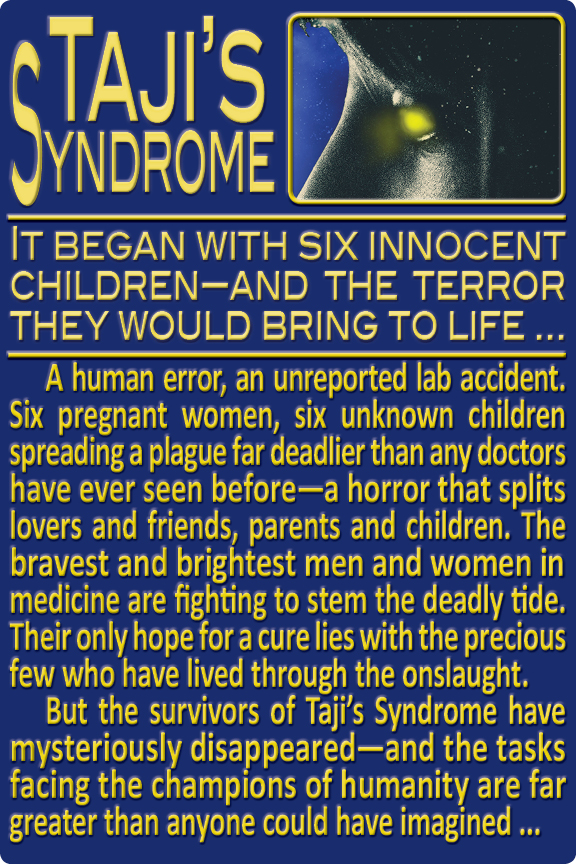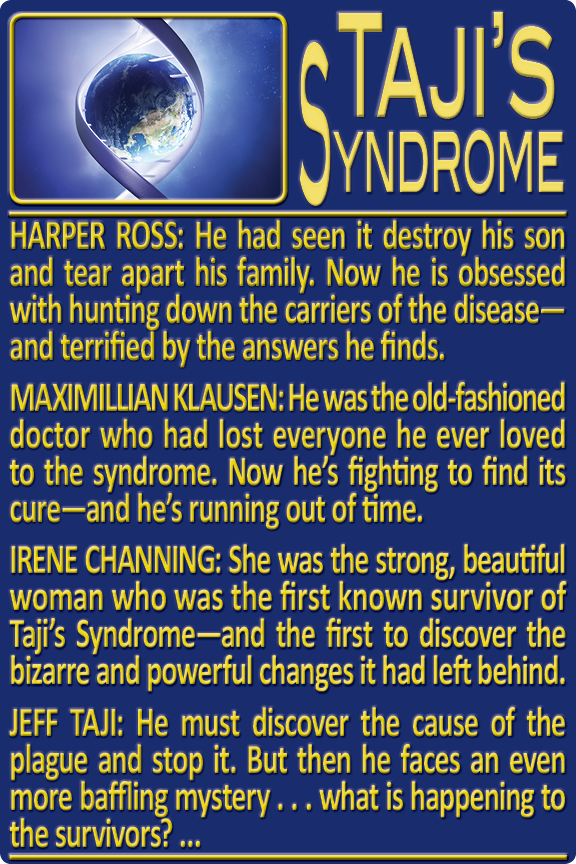Taji's Syndrome
Authors: Chelsea Quinn Yarbro
Tags: #Chelsea Quinn Yarbro, #DNA, #genetic engineering, #Horror, #plague, #Paranormal, #Science Fiction






SOMEONE
was careless.
Ever since the hospital called, Melinda Gower was increasingly unable to concentrate. Her scattered thoughts kept going over the smooth reassurances of the admissions nurse who had repeatedly said that Bill’s condition was not critical, each time finding more questionable inflections in what she had been told: was it “and we think he’ll stabilize
quickly”
or had the emphasis been different—“and we
think
he’ll stabilize quickly”? No matter how she tried, Melinda could not decide how to interpret what she had heard.
“Just finish up and get out of here,” said her boss, Julio Mendez, who was senior laboratory technician on the swing shift. “Get to the hospital. Give me a call when you find out how Bill’s doing.”
The laboratory was a forty-five-minute drive from the hospital in Salinas, most of it over a two-lane blacktop road that skirted the edge of the gulleys at the eastern side of the valley before crossing the flat agricultural land that spread out toward the coast range. It was not the sort of road that tempted drivers to speed, except for the assistant director of research who liked showing off his Ferrari.
“Thanks,” Melinda said as she went about cleaning up the material left for disposal. Her sterile lab suit felt too hot and too tight as she worked, and for the first time her face mask fogged as she hurried to the sink to complete what would have been her first round of chores on an ordinary night. She was so distracted that she dropped one of the little flasks into the stainless steel sink, drawing back as it shattered.
“What’s happening?” Julio called to her.
“Dropped something,” Melinda said breathlessly.
“Anything important?”
“I don’t think so,” she answered as she looked at what was left of the flask.
“Where?” Julio was in the middle of transferring some new slides and so could not risk interrupting the delicate work to come and see for himself.
“In the sink.”
“Filter in place?” He took a chance and glanced at her long enough to satisfy himself that nothing too dreadful had happened.
Though she had not checked it, Melinda said “Sure,” while she hurried through the cleaning procedures, cutting what few corners she dared and cursing Isobel Merriman for being home with an asthma attack. If Isobel had been here, Melinda could have left as soon as the call had come from the hospital. As it was, she could not leave until the first cleanup was over.
“Whose is it?” Julio asked, still concentrating on his own work.
“I . . . guess it’s Hale’s,” said Melinda, trying to make out the name on the torn label. Hale was working on a project to come up with an ecologically safe way to get industrial wastes out of rivers and streams.
“Sure it’s not Katz?” Julio said, just to be careful, since Katz was the virologist purportedly trying to develop a way to mutate cancer cells so that they would serve as an antibody against themselves, a project which had been disappointing in its results.
“It’s Hale,” she said with more certainty as she glanced once again at the smeared ink of the first three letters.
“Okay. No worry, then.” He could think of nothing more to say to her that would not interrupt her work and slow her down. “Just so long as it’s Hale’s.” He concentrated on the slides.
“Julio,” she called, as she drained out the first cleaning solution and started to mix the second with hot water, “do you mind if I call the hospital before I leave?”
“Go ahead. Call right now, if you like.” He was working with the third rack of slides, watching them with fascination, for he could not imagine what lurked on them.
“I will in a minute.” Melinda was rushing, but she could not stop herself. The thought of Bill collapsing in the middle of a softball game, possibly from a “mild” heart attack, was too incomprehensible, too horrible to shove aside. Bill’s only thirty-six, she repeated over and over like a prayer.
“I’ll give you a hand as soon as I can,” Julio promised Melinda. He sensed that her worry was turning into panic.
“Fine, fine,” Melinda replied. She was already draining the second sinkful of liquid when she realized that the two lower filter traps were not in place, and that the effluvia from the glassware in the sink—to say nothing of the contents of the broken flask—were flowing into the drain. She stared in disbelief, aghast that she could do such a thing.
A jangle from the phone distracted her and she moved away from the sink to answer the summons, dreading what she might learn when she answered it.
The impossibly minute particles of DNA continued to run out the drain, into the landfill that was used as an additional and theoretically redundant filter.
The news from the hospital was less confident than before, and Melinda put down the receiver with trembling hands. “I have to go, Julio. Now.”
He did not argue. “All right. I’ll handle things here. Tell Bill I—” Then he saw her face and stopped. “Don’t forget your umbrella,” he said in a clumsy attempt to comfort her.
* * *
Not only did the heavy storm close the road from the laboratory to the freeway, in less than twelve hours it saturated the landfill so that the material from the broken flask washed into the rising waters of the nearest river, but when it overflowed its banks, the modified DNA from Dr. Katz’s most recent efforts spilled into a field just planted with lettuce.
Prompt action on the part of the lettuce-grower saved more than two thirds of his crop, and in a few months his harvest was shipped, some to markets, some to restaurant suppliers, some to institutions. Most of those people who ate the lettuce from that particular field experienced nothing more than a day of upset stomach and abdominal cramps, though a few of the elderly were ill somewhat longer and their ailment was assumed to be some new sort of intestinal flu.
But there were exceptions. For these six the coiled alteration in the lettuce brought much more than flu.
—Cesily Harmmon—
“Have some of the salad bar,” Erin Donnell suggested to Cesily as they stood in line for the buffet. “It doesn’t look too bad.”
“You’d think they could have some decent food at a fundraiser,” Cesily said lightly, her complaint hardly more than an excuse for conversation. “Or do they want us to ante up more and then they’ll bring out something worth eating?”
Erin laughed dutifully and helped herself to a small, hard section of corn-on-the-cob. “How does Brandon feel about the new baby coming?”
“He’s very pleased with himself,” Cesily said, reaching for the serving tongs in the lettuce bowl. “I think you’re right about the salad. I don’t think they can ruin raw veggies, can they?”
Erin shrugged, her expensive dress glistening with the movement. “Don’t bet on it.” She sneered at the various offerings in hot trays, all covered in brown sauce. “I haven’t seen mystery meat like that since college.”
“Have salad with me,” suggested Cesily. “Say, how did you handle telling Mike about a new baby coming? I’ve tried to break it to Eric, but I’m not certain he understands.”
“Oh, don’t worry about that. Just answer his questions when he asks them. And he’ll ask them, never fear. Both of mine were unstoppable when I was carrying Maude.” She took a little of the pickled beets. “How’s Brandon doing with the new firm?”
“Very well,” Cesily said with pride. “He’s being offered a partnership already, and with the clients he brought in when he went with Becker and Jackobsen, he’s one of their most valuable assets, or so they’ve told Brandon. Do you think the buttermilk dressing would be too fattening?”
“Anything to disguise the taste of the rest of it,” said Erin, adding, “I hope they finish before the traffic piles up too much. I have to be in Pasadena by four: my mother’s still in the hospital.”
“Oh, I’m sorry,” said Cesily with feeling. “Is there anything I can do?”
“Short of pulling the plug, not a damn thing.” They made their way back to their table and ate in silence.
Cesily was one hundred three days pregnant.
—Irene Poulakis—
It was bad enough that the two galleries in town had turned her down, but Irene cursed herself that she had waited so long to have the clinic confirm what she knew already.
“We’re sorry, but after the first three months, it’s not as . . . simple a procedure, Missus Poulakis.”
“Miss Poulakis,” Irene corrected the receptionist. “I see. How far gone am I?”
“The report indicates that you are at least one hundred days pregnant.” She did not lift her eyes from the page on her desk. “If there is some reason why it would be necessary to terminate now, there are risks you ought to consider.”
“Great.” Irene stood up. “Let me think about it, okay? I have to . . . think about it.” She did not want to admit it, but she was more confused than she thought she would be. If only Tim hadn’t taken that job in Phoenix, they might work something out, but as it was . . . She shook herself. “Is there any place around here I could get lunch?” she asked.
“There’s a deli in the next block. The sandwiches are pretty good.” The receptionist looked at Irene with concern. “Are you all right, Miss Poulakis?”
“I will be. I . . . I’ll be back. As soon as I’ve made up my mind.” She wandered toward the door, castigating herself inwardly for her lack of decision. Usually she was the sort of woman who knew what had to be done and did it.
Over a bacon-lettuce-and-tomato sandwich, Irene came to the conclusion that she wanted the baby, no matter what else happened. She was an artist, she reasoned, and that gave her a bit more leeway than most women had. It was useless to wait for a possible husband, for that might never happen. She had always wanted to have children. “Might as well start now,” she said to the air, and was given a refill of dreadful coffee.
She was one hundred nine days pregnant.
—Hilda Barenssen—
Much as she tried to, Hilda could not warm to her sister-in-law; Kirsten’s religious fervor made her impossible to approach and difficult to speak with.
“God is showing you His blessing,” exclaimed Kirsten when Hilda told her that she was carrying twins. “What favor!”
“I hope I think so when they both want a two A.M. feeding,” said Hilda, smiling so that Kirsten would know she was making a joke.
But Kirsten’s mouth became a straight line. “It isn’t your place to make light of the gifts of the Lord,” she reprimanded her guest sternly. “God has chosen you to be the vessel for two of His treasured souls, and you can think of nothing more than the . . . inconvenience. I’m ashamed of you, Hilda.” She got up from the table and stalked into her kitchen, her spine rigid with suppressed outrage.
Hilda sighed. She had promised Sven that she would try to get along better with Kirsten—after all, Kirsten was the only family Sven had left—but she knew it was going to be more awkward than she had feared. As Kirsten came back with two plates, Hilda tried to show enthusiasm for the spartan brunch Kirsten offered: molded gelatin salad on a bed of lettuce.
Kirsten put the plates on the table, took her seat and bowed her head, waiting for Hilda to do the same. “Merciful God, we thank Thee for Thy bounty which Thou hast given us for the maintenance of our bodies, which are the temple of the soul. We thank Thee for the riches Thou hast bestowed on Thy handmaiden Hilda in the children Thou hast seen fit to honor her in bearing. We dedicate ourselves and the unborn to doing Thy Will to Thy Glory and the Glory of Thy begotten Son Jesus. Amen.”
“Amen,” Hilda echoed, looking at the drab square of yellow gelatin and the slightly wilted lettuce beneath it.
She was ninety-eight days pregnant.
—Catherine Grey—
Who would have thought that her life would turn out so perfectly? Catherine asked herself as she strolled down the deck of the cruise ship, watching the coast of Mexico slide by in the distance. After the hideous years with Gary, to find Jonathon at last.
At first she had been afraid that she would not be able to deal with his three children, or the occasional ordeals of sending them to stay with their mother; but in very little time her life had settled into a pattern that might have seemed routine if she weren’t so completely happy. This five-day cruise was a second wedding anniversary gift, and she was thrilled with it, and more besotted with Jonathon than ever.
“I wondered where you’d got to,” he said, coming up to her and putting his arm around her. “I was looking all over for you.”
“Where could I go?” she asked, laughing. That was what she loved best about Jonathon—his innate capacity to make her laugh.
“Not overboard, I hope. Especially now.” He leaned over and nuzzled her neck.
A quiver of apprehension went through her. “Are you really sure about this?”
“Of course I am,” he said, shocked. “Aren’t you?”
“I . . . yes. But the kids . . . ” She put her hand to her abdomen, feeling the new tautness there.
“They’re delighted. Really. And it will make us more a family, you’ll see.” He pointed out over the sea. “Look. There’s porpoises, or dolphins, or whatever they are.”
Obediently she tried to make out the rolling shapes in the glinting sea. “They’re a long way off.”
